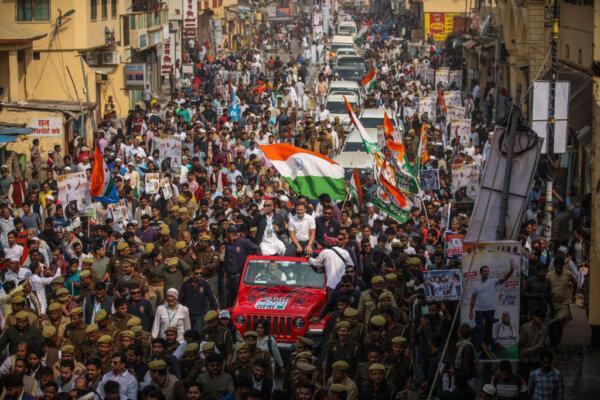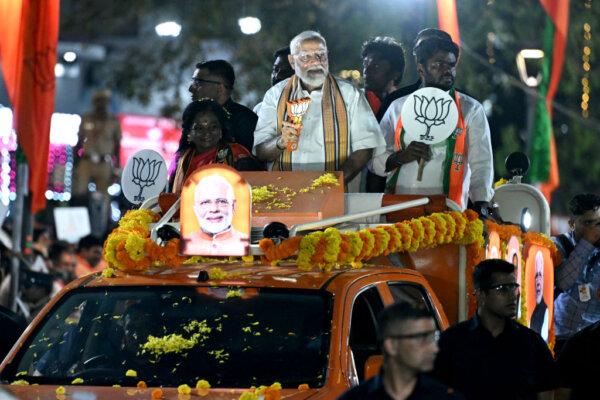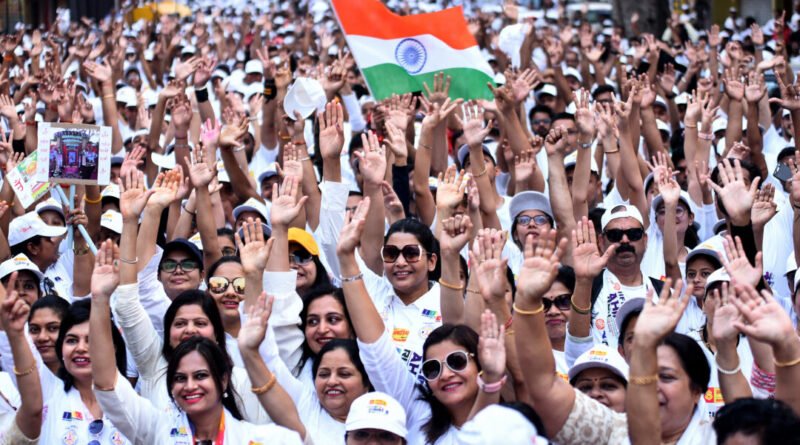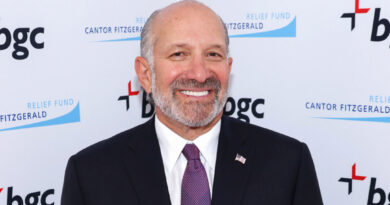Experts Analyze the Importance of India’s Upcoming Elections in a Changing Democratic Landscape
Over 950 million voters will head to the polls in India’s elections next week. A look at the election’s domestic and global importance.
NEW DELHI—India, the world’s most populous democracy, is getting ready for a six-week-long election schedule starting April 19 to elect its next federal government. It’s an event that will shape India’s policy, economy and rise over the next five years.
Estimated to be the world’s largest-ever democratic exercise, the elections will involve 945 million registered voters, more than the entire populations of North America and South America put together. They are expected to be the most expensive polls in world history, even surpassing the election budget of the United States.
As China’s economy spirals down and the Washington–Beijing competition reaches new dimensions, optimism about India’s rise in the mid-century is as palpable as concerns about how abiding it would be. Optimists believe in India’s rise—which Prime Minister Narendra Modi recently called “unstoppable”—and there are many reasons for this optimism. Critics say this rise may not be idealistic if India doesn’t manage its challenges well.
The upcoming elections are thus significant in today’s geo-political context because their result will determine India’s trajectory and with it the reinforcement of its democratic institutions, which some experts believe are among the most dynamic in the world.
Aparna Pande is director of the Initiative on the Future of India and South Asia at the Washington-based Hudson Institute. Ms. Pande told The Epoch Times in an email that at a time when democracy and democratic norms are facing a challenge globally, the path taken by the world’s largest democracy is particularly important.
“India is viewed as a friend and partner of countries in the West and Asia because of the ‘India model’ which is that of a democracy that has built strong political institutions and a robust economy and therefore provides an alternative—to the China mode—to the Global South,” said Ms. Pande.
With a fast-growing, emerging economy powered by a workforce of over 500 million, India’s path in the years ahead—in both geopolitical and economic realms—will have a sizeable impact, so the current elections matter not just to Indians but to others around the world.
Moreover, India’s course is already fixed, said Abhijit Iyer-Mitra, a senior fellow at the New Delhi-based Institute of Peace and Conflict Studies. Mr. Iyer-Mitra told The Epoch Times the upcoming election does not signal a “deciding” phase; but one that will reinforce the path it is already taking.
Political democracy in the modern world is just over two centuries old—the U.S. Constitution went into effect in 1789—and in India it is even younger, starting on Jan. 26, 1950, with the adoption of the Indian Constitution. Since then, the country has had 17 general elections, compared to 59 in the United States. With every election and the formation of a new government came new goals and fresh reforms.
Pratik Dattani, an adviser to Bridge India, a UK-based Indian diaspora think tank, told The Epoch Times that the peaceful transition of power in large countries like Brazil and India should be a genuinely joyous occasion for the world. Even in smaller nations like Turkey, the world is watching, because the peaceful transfer of power “contrasts with autocratic regimes like China, and showcases a model of how participatory democracies can and should function,” Mr. Dattani said.

Mid-Century Goals and Absolute Majority
The 2024 elections are happening at an unparalleled time in global history, where rising economies post-pandemic are setting long-term mid-century goals. Their rise is characterized by fast-paced technological development and the design of global supply chains that depend on geo-political alliances and ideological bonding.
“What is the mid-century goal? An industrialized society! Right?” said Mr. Iyer-Mitra. “And industrialization is one of the most extraordinarily socially and politically disruptive processes around.”
To be able to achieve that goal successfully, he feels that India needs a strong party to manage the inevitable disruptions, and a strong party means a party with an “absolute majority” in the elections. The greater the majority with which a party wins, the more emboldened it will be to get reforms done, he said.
There are two main political entities seeking this absolute majority from voters. The first is the current ruling party, the Bhartiya Janta Party (BJP) led by prime minister Narendra Modi. The other is a coalition of 40 parties, the Indian National Developmental Inclusive Alliance (INDIA) led by India’s other main national political party, the Indian National Congress (INC), commonly known as the Congress Party.
With a vote share of 38 percent in the last elections, in 2019, it was BJP’s two-third majority of 303 in a parliament of 450 that emboldened it to introduce some controversial policy reforms that the opposition termed “unilateral” decision making. The INC won only 52 seats in 2019, failing to get 10 percent of the seats necessary to claim the post of opposition leader in the Parliament. However, the alliance it led, the United Progressive Alliance (UPA), won 91 seats, and thus the opposition was created by the UPA.
Today the UPA is replaced by the INDIA alliance, while BJP’s poll pitch has picked up with its ambitious slogan “Ab ki baar 400 paar” meaning “this time we’ll cross 400 seats in the parliament.” Critics and opponents worry that absolute power corrupts and if BJP comes to power with an absolute majority, it will misuse it to change India’s constitution. Whether this will happen and if it will be against national interests only time will tell.
Anil Swarup has served in various key positions with the Indian government, including stints as Secretary of Education and Secretary of Coal. He is the author of the just-published book, “Encounters with Politicians.” In a phone interview, he told The Epoch Times that “messaging matters” tremendously in a democracy.
Mr. Swarup pointed at two incidents that have brought BJP criticism in the past few weeks. One was the arrest of Delhi’s chief minister, Arvind Kejriwal, on March 21, in a money-laundering case. The other was the Congress Party’s allegations that the BJP-led government has frozen its bank accounts ahead of elections.
Mr. Kejriwal was arrested a few days after India’s election commission announced the election dates and enforced the model code of conduct, which meant laying out a set of guidelines for the conduct of political parties and candidates while campaigning and polling. The leader of the Aam Admi Party (AAP), a part of the INDIA coalition, Mr. Kejriwal had skipped nine court summons, beginning last November and ending March 21, shortly before his arrest.
“If senior opposition leaders are put behind the bars before elections, if [the] accounts of a leading political party are frozen, that is not the right messaging,” said Mr. Swarup.
Mr. Kejriwal filed a motion with the Indian Supreme Court after the Delhi High Court upheld his arrest on April 9. The Epoch Times could not independently verify if his arrest was a case of partisan politics. The BJP refutes the allegations, and Mr. Kejriwal remains one of the most news-making politicians among the 40 leaders of the INDIA coalition.
On the other hand, responding to the Congress Party’s allegations, the BJP said that the party has multiple bank accounts and that only three or four have been “attached,” not frozen by the Income Tax Department for the non-payment of dues. The accounts were operational, a BJP spokesman said. News reports said it was a “routine procedure” by the income tax department.
The Epoch Times was unable to verify the truth of these specific allegations and other political war-pitches thrown into the 2024 arena. However, the back and forth of allegations and counter-allegations is nothing new to Indian politics. It means exponential revenue growth for the Indian ad industry, news industry, and political merchandise sales.
Much of the resulting brouhaha is based on emotions—an element that continues to drive Indians more than substantial issues, according to the experts interviewed by The Epoch Times.
“Sometimes in a democracy like ours, substantive issues do not get the prominence probably which they ought to. And so we are focused on, if I can use the term, non-issues, and the politician is able to elude the public at large,” Mr. Swarup said, without naming any specific names.
“They keep losing votes because of it. And he [INC leader Rahul Gandhi] still refused to talk about what exactly [are] the contents of that Chinese Communist Party, Congress Party of India agreement,” said Mr. Iyer-Mitra.
Mr. Dattani considers these to be some of the significant issues that geo-political analysts around the world will likely consider while analyzing the Indian elections.
Mr. Dattani speculated “whether the jailing of a chief minister and ED [Enforcement Directorate] raids on several political opponents will be seen as a step too far by the electorate.” The ED is India’s economic intelligence organization, which works under the government’s Ministry of Finance, implementing and enforcing financial laws.
The question, he said, was “Whether policies matter.” He added: “In Indian general elections, policies announced by political parties rarely matter as people vote for personalities. Voters also don’t penalize politicians for not following through on their policy plans, or not presenting adequately costed policy proposals, in the same way as they do for local elections.”

The Modi Factor
In most of the interviews, one factor received
Source link





